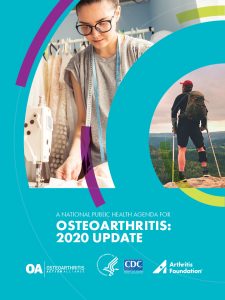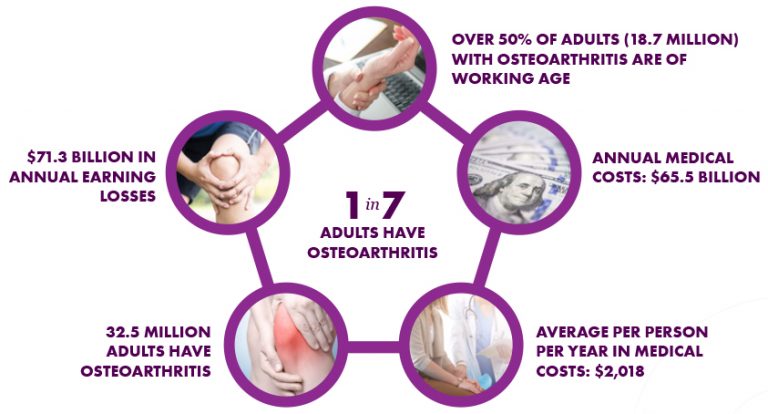A National Public Health Agenda for Osteoarthritis: 2020 Update

Although focused specifically on OA, the updated strategies have wide-ranging applicability to other types of arthritis and chronic conditions. Many adults with OA also have other chronic diseases, such as diabetes, heart disease, and obesity. Taking steps to prevent and manage OA will have the added multiplier effect of improving the lives of adults with these other chronic diseases.
Consistent with the 2010 Agenda, the 2020 strategies are not presented in priority order. Their collective implementation is paramount to improving the quality of life for millions of people in the United States.
View/download the 2020 OA Agenda Update Complete report here
View/download Action Briefs for organizations and people in 7 sectors to Act NOW!
View the 2020 Update – 9 key strategies here

Our Purpose
We envision a nation in which adults with OA are able to live full lives with less pain, stiffness, and disability; greater mobility; and preserved function and independence.
This can best be accomplished if we:
-
Ensure the availability of evidence-based interventions to all US adults with OA.
-
Establish supportive policies, communication initiatives, and strategic alliances for OA prevention and management.
-
Pursue needed research to better understand the overall burden of OA, its risk factors, and effective strategies for prevention and intervention.
Our Strategies
-
Promote evidence-based, self-management programs and behaviors (i.e., self-management education, physical activity, weight management, injury prevention, and health care engagement or provider visits) as nondrug interventions for adults with symptomatic OA.
-
Promote low-impact, moderate-intensity physical activity for adults with OA that includes aerobic, balance, and muscle-strengthening components.
-
Promote weight management for prevention and treatment of OA.
-
Promote, implement, and monitor existing policies and interventions that have been shown to reduce falls and OA-related joint injuries.
-
Expand systems for referral and delivery of evidence-based interventions for adults with OA.
-
Assure equity in access and delivery of interventions that prevent onset and improve management of OA.
-
Establish and implement a public health policy agenda for OA.
-
Strengthen communication and partnerships around OA prevention and treatment.
-
Pursue OA research and evaluation to enhance surveillance, better understand risk factors, explore early diagnosis and treatment, evaluate and refine intervention strategies, and examine emerging data on additional promising interventions.
A useful list of OA resources for implementing currently recognized, evidence-based programs can be found at: https://oaaction.unc.edu/resource-library/
